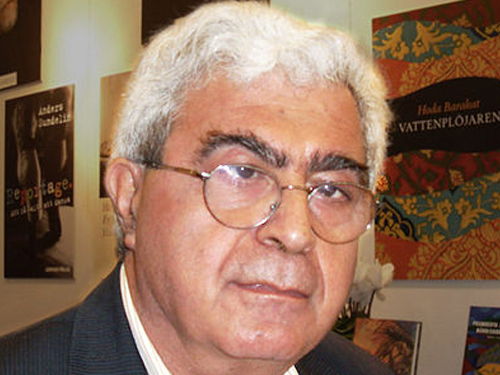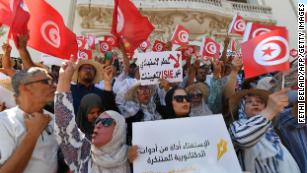
Lebanese literary genius and critic Elias Khoury started his talk at the American University in Cairo last week by analyzing Abbas Kiarostami’s film “Where is My Friend’s House” (1987). The protagonist of the Iranian film is a child adamantly trying to return his friend’s notebook, which he took by accident, to save the friend from being punished in school. A traditional reading of the film harks back to metaphors of a dictatorial regime. But Khoury seeks to add another dimension of the world, as seen through the eyes of children, without masks and free from a dominating discourse.
In his lecture, “Towards an Intellectual-Ethical Code in the Time of the Arab Revolutions,” Khoury found no better way than to rediscover the world through the eyes of a child, reflecting the “profound crisis" that our society has reached, he explained.
He pointed to how “Children of the Stone,” as they were internationally dubbed, occupied the political scene in 1986–87, during the first intifada. Palestinian children caused an upheaval by throwing stones at the Israeli army four years after the Sabra and Shatila massacres in 1982, becoming a tool to shed light on the atrocities of war.
However, “it is not the responsibility of the children,” said Khoury, “but a natural development when the Palestinian officials fail to take a political stance.”
“[Palestine] is an exiled society because it is denied its existence,” said Khoury, explaining the matter from a bird’s eye view. Negation became exile, and amid an obstruction of politics and intellect, the Children of the Stones’ intifada was born. Thus, the children were further used as a cultural tool that formulated a cinematic vision in search for a new language.
With the Arab revolutions, it is no different, Khoury said. He cited the example of the tortured corpse of a 13-year-old Syrian boy that ignited long and dormant anger in marginalized towns in Syria, and the marginalized and minorities who led to the ousting of rulers since 2011.
The Bahraini and Syrian uprisings by marginalized people without leadership were unanticipated. In Tunisia, it was the suicide of Mohamed Bouazizi, and in Egypt the death of Khaled Saeed. Khoury says we all became Khaled Saeed, “the infection” spread to neighboring countries.
The surprising success of this explosion of energy needs to be examined with new tools, Khoury argued. It was a revolution to restore dignity, he says, that was lost along with its identity in the age of globalization and dictatorship that “erased all values.”
But, the struggle continues beyond the removal of a dictator, or a new president coming to power, like in the case of Egypt. At times, military institutions obliterated the state at the expense of the regime. At others, the structure of the dictatorship marginalized the military for the sake of hereditary rule. Throughout the struggles, children are present. The Syrian nation protested for the sake of its children, who revolted by writing “The people demand the fall of the regime” on the walls of their schools. The children’s acts carry a humanistic measure, but we cannot call it a children’s revolution, said Khoury.
Khoury also added that to develop an intellectual-ethical code, one must realize how each country adopts a different approach with its dictator, despite the unified goals of Arab nations. “The revolution led Arabs to discover their unity and differences, and that they need an awareness of the meaning of democracy.”
There is “no conspiracy except for its promoters,” he said, arguing that the rise of Islamists to power is not a conspiracy, the neo-liberal approach is not a conspiracy with the West, and that charity work is a vision for development and social justice.
“The biggest challenge that faces the Arab revolutions is the ethical challenge … and to fill the vacuum created by tyranny,” without totally excluding religion, he said. Khoury urged civil society to free itself from fanaticism and leave behind the dominance of planners and activists.
He closed his lecture by reiterating the famous slogan: “Religion is for God, and the homeland is for all.”
This lecture is from a series titled “Aesthetics and Politics: Counter-Narratives, New Publics, and the Role of Dissent in the Arab World,” which will take place until 27 September.




